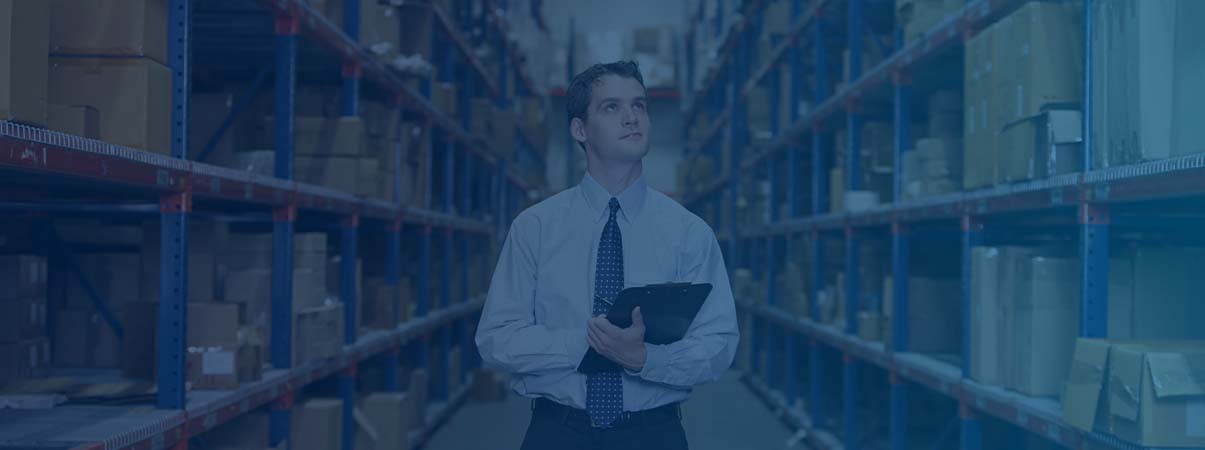Your growing business has a lot of moving parts and that’s worrisome. Your grip on the business feels less sure.
So you’re looking for a solution to stay on top of all this movement, especially in your warehouse operations, the foundation of your distribution or wholesale business.
Perhaps you’re unclear about the differences between Warehouse Management System (WMS) and Enterprise Resource Planning (ERP) system. In your mind, they may be interchangeable. After all, they do share some of the same functions.
In this article, we’ll explain what WMS and ERP systems do, highlight their differences, and guide you through the questions that will help you evaluate which solution would be right for you.
What is Warehouse Management System (WMS)?

WMS is software that helps you manage the movement and storage of your stock in a warehouse. As the name states, WMS is a standalone system dedicated exclusively to the warehouse operations of your supply chain management. And, just as cars have different accessories, warehouse management systems also come with various features.
Benefits of warehouse management software
Classic WMS enables you to do the following:
- Track every item in your inventory (via barcode scanning or radio frequency identification (RFID) as it’s received, stored, picked, packed, shipped, or returned.
- Automate a range of processes from receiving to order fulfillment.
- Organize tasks and allocate employees to them.
- Increase picking efficiency by prioritizing stocking locations.
- Use analytics to optimize your warehouse performance.
For bigger companies with warehouses managing high volumes and more complex processes, WMS come with more advanced features:
- Cross-docking so your team can receive and ship SKU without actually storing it in your warehouse.
- Warehouse layout planning to optimize your storage space.
- More sophisticated analytics for deeper insight into your warehouse performance.
Your team will need technology such as barcode scanners, mobile computers, wireless LANs, and RFID capability to benefit from WMS fully.
Just know that if you want to apply the productivity enhancements of WMS to other functions in your business, such as accounting or purchasing, you’re stuck. WMS does not communicate with the other functions of your business.
That’s where ERP systems come in.
What is Enterprise Resource Planning (ERP) system?

ERP system standardizes and centralizes all the data of your business functions from accounting and order entry to purchasing and inventory management.
This means you can forget about all the individual electronic files, paper files, and post-its your siloed business units may be storing information in. ERP facilitates the flow of information by enabling every function in your business to instantly communicate with any other function, 24/7, with real-time data. And that’s only the beginning.
Have more questions about ERP systems? Read our article, “What is an ERP? Your Most Common Questions are Answered Here”
Benefits of ERP system
ERP systems elevate the overall productivity and profitability of your business in many ways by delivering benefits such as these:
- Streamlined costs, due to 360-degree, real-time visibility into your operations. This visibility makes it dramatically easier and faster to gather the information needed for planning, coordinating, forecasting, and making decisions. Thus, managers can proactively identify where business units are not performing.
- Reduced risk through this full visibility
- Increased productivity thanks to better planning and coordination.
- Improved agility with reporting and analytics tools that support greater insight into your accumulated business data.
- Always-on financial analytics. Being able to monitor financial KPIs (Key Performance Indicators) in real time may be the single most impactful benefit of an ERP.
For example, you can track real-time information on which orders have the best profit margins. If product X sells well but has a low-profit margin, you could restock product Y, which has a higher profit and lower sales. This real-time capability allows you to be proactive in improving your return on investment (ROI).
Keep in mind that some ERPs offer warehouse management capability as an add-on. Other ERPs, like Fidelio, have developed WMS modules.
To learn more about how to manage inventory through ERP, click on our article, “5 Ways ERP Inventory Management Levels Up Your Business”
WMS vs. ERP
In summary, both WMS and ERP enable you to track your inventory in real time. On one hand, WMS has a lot of options for advanced features to manage your warehouse operations.
On the other hand, if you want to automate tasks, improve productivity and profitability, and mitigate risk for your entire business, then ERP system will respond to those needs. It’s true, though, that ERP implementation will also require a bigger investment of time and money.
It’s time to ask yourself the big question.
Which tool is right for your growing business?
To clarify which solution will deliver the best ROI on your goals, you need to sit with your executive team to answer questions such as these:
- What are your long-term goals? How will you track the long-term goals of your business? What measurable outcomes (metrics) will define your success?
- What tools does your growing business need to reach these goals?
- What are the costs of buying, implementing, and adapting to these tools? Can you support these costs?
- What return on investment (ROI) and break-even point will be satisfactory?
Check out our webinar ''How to Select the Right Distribution ERP Software in 5 Simple Steps''.
If you have more questions on the WMS and ERP issue, do reach out to us. We have over 25 years of experience in the field and would be happy to help.





